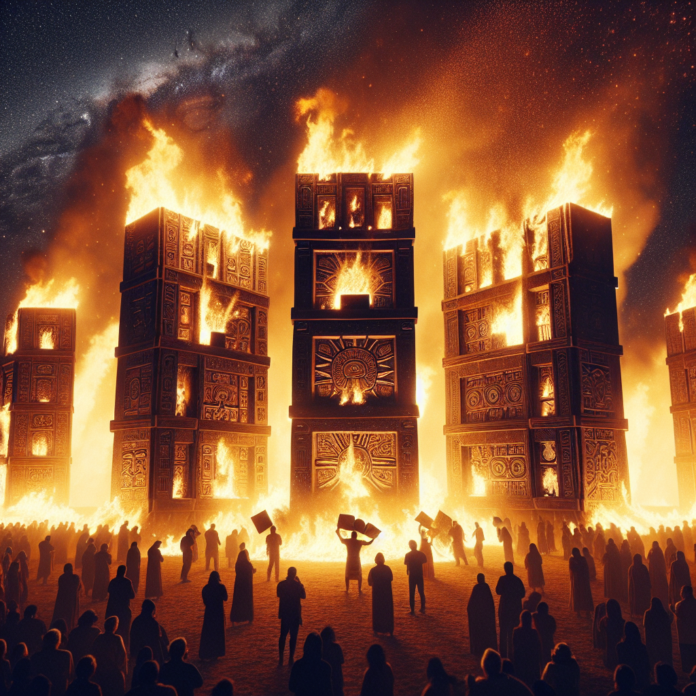Faith and Fire: The Burning of Indigenous Codices in Mexico
The centuries-old tradition and rich cultural heritage of Indigenous societies in Mexico were systematically obliterated by European colonizers, cloaked under the guise of religious zeal and moral righteousness. This episode is not merely a historical footnote but a poignant reminder of the consequences when tradition is wielded as a weapon against progress and enlightenment. The burning of Indigenous codices exemplifies one of the darkest chapters in human history—a deliberate attempt to erase the intellectual and spiritual wealth of pre-Columbian civilizations.
When Hernán Cortés and his retinue arrived in 1519, they encountered a world brimming with vibrancy and complexity. Indigenous peoples such as the Aztecs, Maya, and Mixtecs had developed sophisticated societal structures, advanced astronomical knowledge, and a literary corpus that captured their wisdom, myths, scientific observations, and philosophical musings. These records, often inscribed in codices—long, folded documents composed of bark paper or deerskin—were central to their cultural identity and continuity.
However, what should have been a fertile ground for cross-cultural exchange became a battlefield. The Spanish conquistadors, driven by conquest and a dogmatic devotion to their version of Christianity, dismissed the Indigenous cultures as heathenish and inferior. The friars who accompanied the conquest, particularly the Franciscans, took it upon themselves to ‘civilize’ the native population. They saw the codices not as invaluable texts of knowledge but as instruments of idolatry that had to be obliterated to save the souls of the Indigenous people.
One of the most notorious figures in this cultural genocide was Bishop Diego de Landa. Arriving in the Yucatán Peninsula in the mid-16th century, Landa initially evinced a rare curiosity about the Maya civilization, even learning the Yucatec Maya language. However, his methods soon turned fanatical. Alarmed by what he saw as rampant idol worship, he organized an auto-da-fe in 1562 in the town of Maní. During this event, he ordered the burning of countless Maya codices and thousands of sacred idols, rationalizing his actions as necessary to combat heresy. He later lamented in his writings, albeit with disturbing self-satisfaction, that “we found a large number of books of these characters, and as they contained nothing but superstitions and falsehoods of the devil, we burned them all…”
The loss was catastrophic. The codices were not mere books; they were the repositories of centuries of accumulated wisdom, documenting everything from astronomical calculations to historical chronicles, from medical knowledge to ceremonial rituals. Their destruction was akin to burning down entire libraries, resulting in irreparable damage to the cultural legacy of the Maya.
Historians estimate that there were once hundreds, if not thousands, of codices across Mesoamerica. Today, only a handful survive, like the Madrid Codex, the Dresden Codex, and the Paris Codex. These remnants offer tantalizing glimpses into the once-thriving intellectual traditions of Indigenous Mexico but also serve as solemn tombstones to what was lost.
The narratives crafted by European colonizers often portray the Indigenous people as passive victims or mere footnotes in the story of European triumph. However, this is a gross and convenient oversimplification. The Indigenous peoples resisted and adapted in myriad ways. They hid codices, maintained oral traditions, and subtly infused Christian practices with Indigenous elements to preserve their cultural identity.
Moreover, long after the flames of the auto-da-fé had been extinguished, the embers of Indigenous knowledge continued to smolder. Modern scholars, activists, and descendants of these ancient civilizations have striven to revive and reinterpret the remaining codices. Collaborations between archaeologists, linguists, and Indigenous communities have led to significant breakthroughs in understanding these texts, thereby restoring some measure of justice and dignity to the long-silenced voices.
Yet, this story is not just about the past. It intersects profoundly with contemporary issues of cultural preservation, identity, and decolonization. In ways both overt and covert, the forces of traditionalism continue to exert pressure on progressive efforts to recognize and rectify historical wrongs. Current debates over cultural heritage, Indigenous rights, and educational curricula are echoes of this historical struggle. They underscore the necessity of fostering environments where diverse cultural expressions are not only tolerated but celebrated.
Some may question the relevance of events that transpired over 500 years ago. Consider this: when a culture’s foundation is systematically dismantled, its people are forcibly deprived of their history and identity. The aftereffects ripple across generations, manifesting as socio-economic disparities, loss of language, and erasure of cultural practices.
To move forward, we must engage with this past honestly and critically. Recognizing the burning of the codices is not merely an academic exercise; it is an ethical imperative. It challenges us to confront the damaging legacies of colonialism and work towards a world where the diversity of human experience is acknowledged and valued.
The flames that consumed the codices were ignited by ignorance and fear masquerading as divine intervention. In our quest for a more just and enlightened world, it is incumbent upon us to champion progress and inclusivity over the destructive allure of traditionalism. The memory of the lost codices should fuel not a desire for vengeance but a commitment to safeguarding the cultural mosaic that enriches our collective human heritage.
